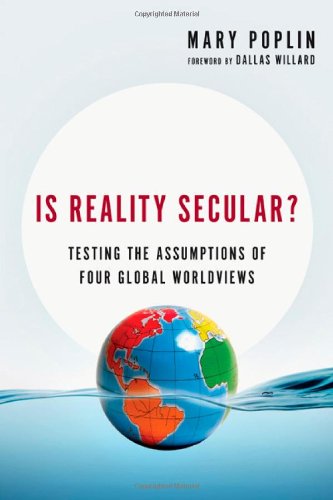A Brief Book Summary from Books At a Glance
About the Author
Mary Poplin (PhD, University of Texas) is professor of education at Claremont Graduate University in California, where she has served as director of the teacher education program and dean of the School of Educational Studies. She is a frequent speaker at Veritas Forums and the author of Finding Calcutta: What Mother Teresa Taught Me About Meaningful Work and Science.
Introduction
In this book, scholar Mary Poplin—formerly a secularist professor—explores different worldviews and presents the strengths of the Christian worldview to which she converted in mid-life. She explores material naturalism, secular humanism, pantheism, and the Judeo-Christian views of the world. Poplin explains each view and points out the inconsistencies and weaknesses of the worldviews that reject the truth of Christ. The uniqueness and strength of Christianity is articulated and defended. Poplin is uniquely well-suited to write about worldviews from an academic perspective.
Table of Contents
Foreword: Dallas Willard
Part One: Is Reality Secular?
Chapter 1 Truth and Consequences
Chapter 2 Confessions of a Professor
Chapter 3 Worldviews as Operating Systems of the Mind
Chapter 4 Tracing History up to Now
Part Two: Material Naturalism
Chapter 5 Everything Is a Thing
Chapter 6 Science as the Only Truth
Chapter 7 The Purposeless Universe Emerged from Nothing
Chapter 8 No Miracles Allowed
Chapter 9 The Ethics of Things upon Things
Chapter 10 Countering God as Creator
Part Three: Secular Humanism
Chapter 11 Man Makes Himself and His World
Chapter 12 Radical Individual Freedom
Chapter 13 Varieties of Secular Humanism
Chapter 14 Principles of Secular and Christian Psychology
Chapter 15 Finding Moral Truth in Human Dialogue
Chapter 16 Exorcising Sin
Chapter 17 Contesting Jesus as Divine
Part Four: Pantheism
Chapter 18 Immanence—The Spirit Within Us
Chapter 19 To Eliminate Suffering, Jettison Desire
Chapter 20 Pantheism’s Many Faces
Chapter 21 Western Pantheism—Spiritual, Not Religious
Chapter 22 Spiritual Transactions in People, Nature and Nations
Chapter 23 Contesting the Holy Spirit
Part Five: What if Judeo-Christianity is True?
Chapter 24 A Wider Rationality
Chapter 25 The Triune God
Chapter 26 Jesus, Redeemer of Man and the World
Chapter 27 Signposts of Reality
Summary
Part One: Is Reality Secular?
Over the last several centuries, the Western world has embraced secularism as its controlling metanarrative. Currently, secularism dominates society and public discourse, regardless of its truth or utility. Religious perspectives are dismissed as unscientific and science is held up as the means to find rational answers in every area, including ethics. Religions are depicted as perpetuating violence, but the violence of secular states is overlooked. We need to understand major worldviews so that we can identify and escape from ideology and indoctrination. Secularism has been assumed to be true, but it has never been demonstrated to be true. Poplin grew up in the liberalism of the drug and sex culture of the 1960s and 70s, in which she was an active participant. She was an advocate for the thought and values of the far left, and taught her students from this perspective. As her views proved more and more untenable, Poplin explored various forms of spirituality. During a research trip to Calcutta to see Mother Teresa, Poplin realized that what she found there did not fit into any of her intellectual grids. In the end, she was converted to Christianity.
Worldviews operate on our minds like computer operating systems. They determine the range of our thinking and how we interpret reality. It is easy to see the effects of worldviews when we consider and evaluate ethical issues like abortion. This book looks at four major worldviews: material naturalism, secular humanism, pantheism, and monotheism (in its Judeo-Christian form). Every worldview begins with faith because they all begin with deep beliefs that cannot be verified scientifically. Every non-Christian worldview contains some elements of the Judeo-Christian view, as well as beliefs that are irreconcilable with it. All of these worldviews have existed throughout history. The big question is which one is true; which one describes reality.
The main principles of non-Christian worldviews were all…
[To continue reading this summary, please see below....]The remainder of this article is premium content. Become a member to continue reading.
Already have an account? Sign In
